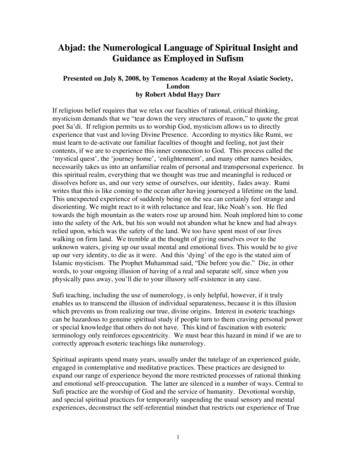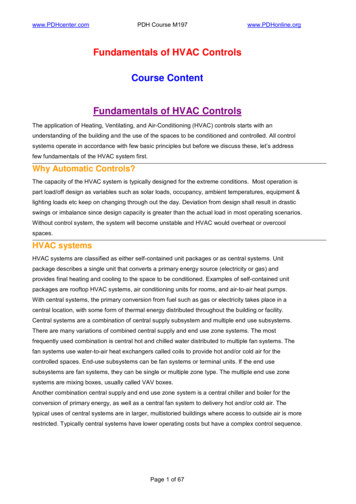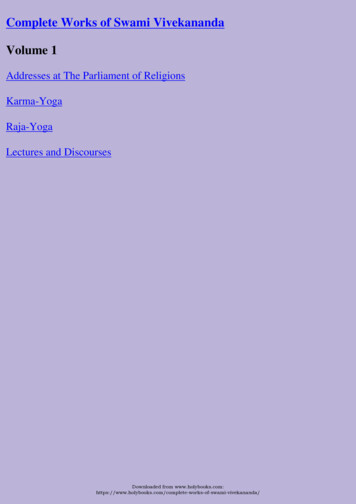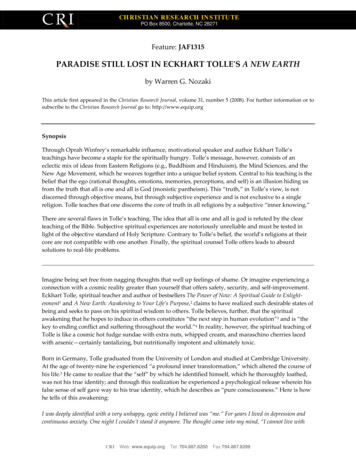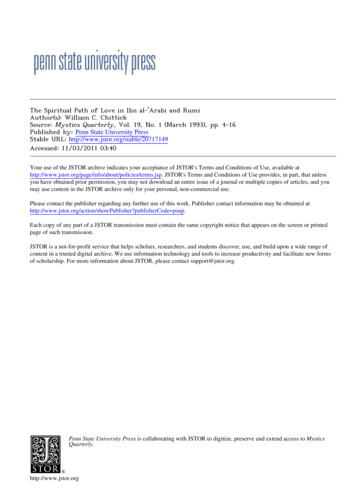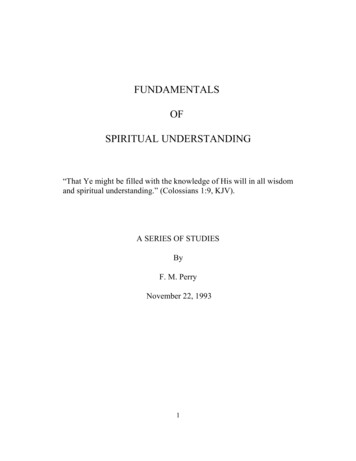
Transcription
FUNDAMENTALSOFSPIRITUAL UNDERSTANDING“That Ye might be filled with the knowledge of His will in all wisdomand spiritual understanding.” (Colossians 1:9, KJV).A SERIES OF STUDIESByF. M. PerryNovember 22, 19931
2LESSON 1FUNDAMENTALS OF SPIRITUAL UNDERSTANDINGThe Invisible ThingsQuestions tor study.1. Cite today's common use meanings of the words "spirit" and"spiritual". Use dictionary if necessary.2. What are the meanings of the words "spirit" (0. T. Hebrew wordruach, N. T. Greek word pneuma) and "spiritual" (N. T. Greek wordpneumatikos) as used in the Bible). (See Gen 1:2; 1 Kings 22:21; Job10:12; Psalm 31:5; Psalm 104:4; Prov. 25:28; Eccl. 12:7; Isaiah 11:2;Isaiah 26:9; John 1:32; John 4:24; John 12:32; Acts 7:59; Rom. 1:9; 1Cor. 14:14-15; 1 Thess. 5:23; Heb. 4:12; Rom. 1:11; Col. 3:16; 1 Cor.15:44-46).3. What is the essence of a "spirit"? (Luke 24:39).4. Name some of the invisible beings (spirits) mentioned in the Bible.(John 4:24; Acts 7:30,35; Heb. 1:13-14; Luke 1:26; Matt. 25:31; Matt.26:53; 1 John 4:1-3; Matt. 4:1; 1 Cor. 10:20-21; Job 1:6; Matt. 16:23;Acts 5:3; 2 Cor. 11:14; Rev. 12:7-13).5. Name the three parts of a human being as revealed in the Bible.Which of these parts are "visible" to the senses of the flesh and whichare "invisible?" (1 Thess. 5:23).6. Can these parts of a human being live separately? Will they ever beseparated? (James 2:26; Eccl. 12:7; Matt. 10:28; Acts 7:59).7. How do we know that the term "soul" is not just a term for a humanbeing to include both "body" and "spirit?" How do we know that theterm soul is not just another term for “spirit?” (Heb 4:12; Matt. 10:26;Provo 23:7; Phil. 1:27; 1 Pet. 2:11; Luke 10:27).
38. Consider the following concept: “The spirit quickening the bodymade man a living soul, a living person with the consciousness ofhimself. The soul was the meeting place, the point of union betweenbody and spirit. Through the body, man, the living soul stood related tothe external world of sense; could influence it, or be influenced by it.Through the spirit he stood related to the spiritual world and the Spiritof God, whence he had his origin; could be the recipient and the ministerof its life and power. Standing thus midway between two realms,belonging to both, the soul had the power of determining itself, ofchoosing or refusing the objects by which it was surrounded, and towhich it stood related.” Is this concept of the function of man's spirit,soul, and body borne out by the teachings of the Bible?
4FUNDAMENTALS OF SPIRITUAL UNDERSTANDINGLessons prepared by F. M. Perry in 1993 for presentation during the firstquarter of 1994 at Wednesday Evening Bible classes at Berry's ChapelChurch of Christ.LESSON 1, The Invisible ThingsINTRODUCT1ONIt's a pleasure for me to stand before you to present these lessons on asubject we are calling by the rather high sounding title,FUNDAMENTALS OF SPIRITUAL UNDERSTANDING. I'm anEngineer by profession and I've learned that the key to understandingany complicated subtle thing is to first grasp the fundamental principleson which it is founded. As an electrical engineer I have learned bytraining and by experience that in order to build a new electrical circuit,or understand a circuit that has already been built, or trouble shoot acomplicated piece of electrical equipment, I must first bring to mind thefundamental principles that apply to the circuit. Hopefully, a goodengineer will have his fundamental principles so well in mind that whenhe has a problem put before him, he just automatically starts thinking interms of the fundamental elements of the circuits and how they worktogether in a system.Similarly, the key to understanding the spiritual realm and the spiritualtruths revealed in God's word is for us to understand the basicfundamental spiritual elements and their relationships within thespiritual realm.The su bjec t i s FUN DAMENTALS OF SPIRITUALUNDERSTANDING. What does the Bible mean by the term "spiritualunderstanding?” It is a Bible phrase. It was used by Paul in Col. 1:9.Paul said that he prayed to God that the Colossian Christians might "befilled with the knowledge of His will in all wisdom and spiritualunderstanding," The meaning of that phrase "spiritual understanding"is going to have to unfold as we study. In my study of the Bible I find
5that if something is described with the term "spiritual," it has somethingto do with "spirits." Suffice it to say for the time being that "spirits" are"beings" who are invisible. So this class is going to be a study to seewhat the Bible reveals as fundamentals to help us understand spiritbeings, their realm of operation, their functions, etc.That's the purpose of this study, that we may be filled with "spiritualunderstanding." As Paul prayed for the Ephesians (in Eph. 3:16-19),that they might "be strengthened with power through his Spirit in theinner man: so that Christ may dwell in your hearts through faith, and thatyou, being rooted and grounded in love, may be able to comprehendwith all the saints what is the breadth and length and height and depth,and to know the love of Christ which surpasses knowledge, that youmay be filled up to all the fulness of God." As an engineer I like Paul'slanguage where he said "you . may be able to comprehend . what isthe breadth and length and height and depth," for instance, thedimensions of such a spiritual concept as the love of that great spiritualbeing, God. I'd certainly like to know the dimensions of the invisiblerealm in which the invisible spirits live, and how the invisible concepts,such as the love which characterizes God, flows forth to us.Before we go further lets note the common use meanings of the wordspirit. An American dictionary gives the following definitions:Spirit 1. Immaterial part or man as distinguished from the body .2. The animating or vital principle in living things.3. A supernatural being usually regarded as invisible but having thepower to become visible at will.4. A specified mental or emotional attitude characterizing words,actions, opinions, etc. (She said it in a forgiving spirit.)5. A person animated by a specified quality. (He was one of the braver
6spirits.)6. The emotional attitude or frame of mind characteristic of a group ofpeople. (Team spirit or, spirit of the age.)7. The essential character of something. (The spirit of the law is moreimportant than the letter of the law.)8. Cheerful or assertive liveliness. (Full of the spirit.)9. Mood or temperamental state. (In high spirits or in poor spirits.)10. Liquor of high alcoholic content.Spiritual 1. Relating to or concerned with the soul or spirit (as opposed totemporal).2. Relating to religious or sacred matters (spiritual counsel).3. Having a relationship based on sympathy of thought or feeling. (Sheconsidered him her spiritual father.)4. A religious song asserting a strong simple faith, sung originally byblacks in the Southern USA.As we come to these two words, “spirit” and “spiritual” in theScriptures, lets see which, if any, of these definitions fit the Biblicaldefinitions of the words. I think we will see that some of these commonuse definitions are not applicable to the Bible words, while some ofthem may be pertinent. For instance, which of these common definitionsmay be applied to the word “Spirit” in the Biblical statement, “God isSpirit?”THE INVISIBLE THINGS
7In this introduction lets consider some very fundamental things aboutGod's word. Immediately as we start to study the Bible we notice acontext that is different from secular books. Many of the characters ofthe Bible are not only persons we have never seen, but persons whom noone can see, who are invisible to the five senses of the flesh.Foremost of these persons is God the Father, whom no man has seen atany time (John 1:18). Jesus Christ, the Son of God, was seen in the fleshby people when He lived on earth nearly 2,000 years ago, but since Hisascension into heaven to sit at the right hand of God, He no longer canbe seen. The other person of the Godhead, the Holy Spirit, cannot beseen either. Some others prominently mentioned in the Bible who areinvisible to the senses of human flesh are the angels, and Satan and hisdemons.What kind of beings are these great invisible persons. Jesus answeredthat question concerning God when He said that “God is Spirit" (John4:24). Jesus, Himself, is referred to in John 1:1-14 as "The Word," whowas God. and who became flesh. We conclude that the One who becameJesus in the flesh was originally "Spirit," just as God is "Spirit." Andnow, in His glorified state at the right hand of God, Jesus is again“Spirit," we presume. (1 John 3:2). We shall be like Him. Jesus is nowSpirit just like we will be. Of course, the Holy Spirit, the third personof the Godhead, must be "Spirit." All this is evident in Jesus' statementthat "God is Spirit" (John 4:24).The Hebrew writer refers to the angels as spirits (Heb 1:13-14). Johntells us that there are spirits who are of God and there are spirits who arenot of God (1 John 4:1-3). Obviously those not of God include the evilor unclean spirits, also called demons, whom Jesus sometimes found in,and cast out of, people (Mark 3:11; Luke 8:2). These demons, at times.dwelled in the bodies of people and spoke through the mouths of people,but the demons themselves were invisible. Satan certainly is the spiritleader of all evil spirits, invisible to the senses of our flesh, but existingnone-the-less, and influencing the people or the earth. Jesus spoke ofthe invisibility of spirits when he said that a spirit does not have fleshand bones (Luke 24:39).
8What is the physical essence of spirits and in what physical realm dothey dwell? The Bible asserts the existence of spirit beings andindicates their great importance in the lives of God' s creation. But theyare invisible to fleshly senses. They do not have flesh and bones. TheBible indicates there are many different kinds of spirits, and within thekinds there are many individual spirits. We learn from the Bible thepersonality traits of some individual spirits. But we do not learn what istheir essence, except that it is called “spiritual.” Nor do we learn inwhat specific realm spirits dwell except that it both includes andtranscends our earthly material realm. The Bible indicates that the realmof the spiritual co-exists with our fleshly, earthly realm. And.apparently, the spirits are fully aware of us in the earthly realm, eveninhabiting the earthly realm with us, although also inhabitingdimensions beyond the limits of our earthly realm.But we must conclude that we do not at present know any real (what wemight call scientific) answers to the questions of the essence andboundaries of the spiritual. All we can know about the invisible,spiritual realm is what has been revealed to us by God, and God has notrevealed to us all about the spiritual realm.A beginning of knowledge about the invisible spiritual things, enoughfor us to know that something beyond this visible, physical universeactually exists, is revealed to us through our view of the physicaluniverse in which we live. Our Spiritual God Himself and some of Hisinvisible qualities are discerned not by sensing Him directly but throughthe things that He has created. And we creatures obviously are beingheld responsible to discern and respond to these revelations about theinvisible God and His care for His creation. Romans 1:18-20 reminds usthat we humans don't have a very good record in the exercise of thisresponsibility."For the wrath of God is revealed from heaven against all ungodlinessand unrighteousness of men, who suppress the truth in unrighteousness,because that which is known about God is evident within them; for Godmade it evident to them. For, since the creation of the world Hisinvisible attributes, His eternal power and divine nature, have been
9clearly seen, being understood through what has been made, so that theyare without excuse.” (Romans 1:15-20 NASV).So we use our fleshly senses to deduce the existence of God. Evenbeyond those things we deduce through our fleshly senses, we seem tobe endowed by our Creator with innate "extra-sensory perception" ofmany real but invisible things. We are reminded ln Romans 2:14-15 thatour thoughts are often prompted by knowledge, ingrained by our Creatorin our intuition and conscience, of God's laws for our lives."For when Gentiles who do not have the Law do instinctively the thingsof the Law, these, not having the Law are a law to themselves, in thatthey show the work of the Law written in their hearts, their consciencebearing witness, and their thoughts alternately accusing or elsedefending them." (Rom 2:14-15 NASV).Our consciences, as long as we maintain them clean and un-seared asoriginally created by God, prompt our thoughts to alternately accuse ordefend us in accordance with otherwise invisible laws of God. Weobserve the fact that all peoples of the earth are endowed with thisinnate "sense or ought within" and certainly, we have recognized itsexistence within each of us. It prompts us and holds us responsible toseek for further revelation from our invisible God so that we may fulfillour obligation to serve Him.Of course God has responded to our search for additional revelationabout the unseen realities by giving us His Word, the Bible, in which isrecorded more, although not all we would like to know, but perhaps allthat we are equipped to understand in our present fleshly state. Were itnot for the revelations of the written Bible which we have today, wewould scarcely know anything about our triune God, about Satan, orabout the other invisible beings. Nor would we know about our ownmake up which includes our invisible spiritual parts.The Bible confirms what many of us have suspected by deductions fromnatural revelation, that we humans have invisible spiritual parts whichalso inhabit the realm of spirits. It being revealed in the Bible that we are
10created in the image of the triune spiritual God, we look tor the threeparts which make up each one of us. Revelation meets our query withreferences in both the Old and the New Testaments to the "spirit andsoul and body" of a person. That is the language Paul used, "spirit andsoul and body," as he summed up the complete person in 1 Thess 5:23.The spirit and the soul of a person are invisible to the eyes of the flesh.They inhabit the body of a person while that person lives on earth, butthey are spiritual rather than fleshly, and they are capable of communionwith other spirits (or are they?) and of inhabiting the spiritual realm.As we study our Bibles to learn how we are to take part in the purposesof God, it behooves us to be as well grounded as possible in thefundamentals of who we are, of how wonderfully we are made, and ofwhat our environment, even our invisible environment, consists. Thecreation by God of the three parts of a person is described in Gen 2:7."Then the Lord God formed man of dust from the ground, and breathedinto his nostrils the breath of life; and man became a living being(soul)." (Gen 2:7 NASV).The human body was formed by God of dust from the ground. Godgave life to the person when He gave him a spirit by "breathing" into hisnostrils the breath or life. When God formed the body of man from dustand gave a spirit to him, man became a living soul.Everyone recognizes that each of us has a body of flesh. However,many are confused concerning spirit and soul. Some think the wordsspirit and soul simply are two words with the same meaning describingone and the same part. Others have reasoned that the soul is somehowan extension of the body and not separate from the body. However,confusion on these points is cleared up by two scripture passages.The Hebrew writer tells us in Heb. 4:12 that the soul and spirit can bedivided. Indeed, the passage indicates that a close bonding , betweenthe soul and spirit is an undesirable condition. The scripture says thatthe word of God will act as a sword to divide the soul from the spirit ofa person. Thus, inherent in this very meaningful passage is the
11understanding that the soul is a separate entity from the spirit.A PROBLEM?Perhaps we should pause at this point to discuss a problem which someof us have (and which I have had in the past) concerning Biblicalsupport for the soul as a separate entity from one’s personal body andspirit. The Genesis record says, “Then the Lord formed man of dustfrom the ground, and breathed into his nostrils the breath of life; andman became a living being (soul).” (Gen. 2:7 NASV). Most of usunderstand from this inspired wording that God formed man’s body of“flesh” from “dust from the ground,” and imparted a personal spiritgiving life to the body by “breathing into his nostrils.” But thelanguage, “man became a living soul,” does not seem to some of us toindicate that God actually formed a third and different part to be calledthe “soul.” And such may indeed be the case. The “soul” may not be acompletely separate entity from the personal “spirit.”However, the first chapter of Genesis has already said, “And Godcreated man in His own image, in the image of God He created him.”(Gen.1:27 NASV). And the Bible indicates our God to be Triune, athree-in-one Spiritual Being. Moreover, Biblical revelation from Godto man reveals God’s view of man as a three part being, “spirit and souland body.” (1 Thess. 5:23 NASV). Indeed, much of this study is beingwritten in order to bring to our minds the Biblical evidence that Godthinks of each of us as triune beings, “spirit and soul and body,” and thatBiblical passages would be more meaningful to us if we would think inthat way also.To me, the answer lies in simply envisioning a possibility which lieswell within the thinking ability which God has imparted to me, and atthe same time confirms my faith in His inerrant word. The possibilityis that God has partitioned the “personal spirit” which He breathed intoman so that one part functions as “soul” and another part functions as“personal spirit.” Both “spirits” and “souls” are invisible and of“spiritual essence.” With this understanding, I will continue to treat the“soul” of man as separate from the “spirit” and “body” of man in this
12study.Jesus Himself said in Matt 10:28 that the soul cannot be killed as can thefleshly body and does not die with the fleshly body. Thus we understandthat the soul is a spiritual part similar to one’s personal spirit which isseparate from the body, although it dwells in the body during the life ofthat body.Human beings are characterized in the Bible neither by body alone, norby spirit alone, but by soul. The Bible calls human beings "souls." Forexample, when Jacob went down into Egypt with his family, the Biblespeaks of all the “souls” of the house of Jacob. In the New Testament,after those were baptized who received the gospel message from Peteron the day of Pentecost, we are told that there were added that day aboutthree thousand “souls.” We quickly see in Bible study that the soul of aperson is endowed with the human personality that makes that personindividual and unique.Each of the three parts of the triune person has unique functions in thelife of the person. The soul appears to provide the meeting place or pointof union between body and spirit. Indeed, the soul is the third partwhich functions as “manager" or "director" of the complete triune man.Through the body the living soul is related to the external world of thesenses. Through the body the soul can influence the world or beinfluenced by the world. Through the spirit the living soul is related tothe invisible spiritual realm and the Spirit of God. The spirit can bedirected by the soul to commune with the Spirit of God or with evilspirits. Through the individual human spirit the soul can be the recipientof the life and power of the Holy Spirit, or it can receive rebelliousmessages from evil spirits. The soul, having contact with both the bodyand the spirit and, having overriding influence on them, has the powerof determining the destiny of the person. The soul can choose or refusethe influences to which it is subjected and can direct the body and spiritas it desires.The concept of separate functions of spirit, soul, and body are borne out
13by the usage of the three words in the Bible. This will be a great part ofwhat we study in these classes.Continuing with thoughts about the invisible things, what about theinvisible, non-material spiritual concepts that come from the spiritualrealm, especially those which come from God Himself. I refer to suchspiritual gifts as faith, hope, and love. They are God given conceptscoming to us from the invisible spiritual realm. They emanate from Godand are received by our spiritual parts to be used to sustain us in ourlives in the spiritual realm even while we live on earth. Our faith enablesus to see even now things not otherwise seen, and gives us a store ofknowledge on which to base our actions. Our hope makes us persevereuntil we see all things clearly. Love emanates from only one source, thegreat invisible spiritual God. What blessed results these gifts, faith,hope. and love, yield for us as we live in the world!But how do we receive such spiritual concepts from the invisible Spiritrealm, and how do we confiscate them into our spirit and soul and body?And then how does our spirit and soul and body react in our lives so thatwe rea1ly serve as useful, effective vessels in God's service? These aresome of the things we'll be studying as spiritual fundamentals in thisclass.We want to study such fundamental spiritual things so that we can adoptthe spiritual values of the invisible spirit realm into our lives. I want torecommend that each of you get out your recent October (1993) copy of"The Gospel Advocate" and read the article by Brother J. D. Thomas onpage 28. lt is entitled "Whose Values?" Brother Thomas, in hisinimitable way, has really put his finger on the thing that we want towork toward in this class; that is, recognizing the spiritual values ofJesus Christ, and learning how to factor them into our spiritual life as welive on earth.So by way of introduction, it follows that the most important things inour lives are things we have never seen with our physical senses. It is offundamental importance that we incorporate into our "world view" aworking concept of the invisible spiritual things. It may make a great
14deal of difference to us in the long run that we order our lives here onearth, not just in accordance with the limited dimensions of this earthand its times, but in accordance with the unlimited dimensions of ourreal and complete environment which includes all the invisible spiritualrealm."For momentary, light affliction is producing for us an eternal weightof glory far beyond all comparison, while we look not at the thingswhich are seen, but at the things which are not. seen; for the thingswhich are seen are temporal, but the things which are not seen areeternal." (2 Cor. 4:17-18 NASV)Our understanding of God's word should be greatly enhanced if we willstudy it with an awareness of our own invisible makeup, our invisiblespiritual colleagues, and our invisible spiritual enemies. Our usefulnessto the Lord should be increased if we study God's message to us with anintent to involve our complete triune being in God’s eternal purposes.After all, the Bible speaks to us about such an involvement from anenvironment much expanded beyond the apparent limitations of thismaterial earth. Much of what Jesus said, did, and taught involved theinterworking of the spiritual with the fleshly.Spirits and the spiritual realm are real. There is much more to ourdwelling and working place than meets the natural eye. We live andfunction in this expanded environment now, even though we may notrealize it.No one has seen God. Yet one day Christians shall “see” Him. Shouldwe not be as well prepared on that day as possible with all the revealedknowledge about Him and His spiritual realm that we can absorb fromGod’s revelation?In this study we especially are going to look at the fundamentals of whowe are, of how wonderfully we are made, and of what our environment,even our invisible environment, consists. We are going to take up firstthe "spirit and soul and body" of a person that Paul spoke at in 1 Thess.5:23. We will look for the Biblical account of the origin of the "spirit
15and soul and body" and the way it is typified in the Old and NewTestaments. We will look at the functions of each of these three partsof man, and then the destiny of the three parts.
16LESSON 2FUNDAMENTALS OF SPIRITUAL UNDERSTANDINGIntroducing the Triune ManQuestions for study.1. Cite today's common use meanings of the word "soul."dictionary if necessary.Use2. What is the meaning of the word "soul" (0. T. Hebrew word ruach, N.T. Greek word psuche) as used in the Bible? (Gen. 2:7; Gen. 46:27;Provo 23:7; Acts 2:41; Rom. 13:1; 1 Thess. 5:23; Matt. 10:26; Heb.4:12).3. Cite some of the ways in which man is similar to (created in the imageof) God. (Gen. 1:26; Matt. 26:19; 1 Thess. 5:23).4. How did the Jewish Temple typify the Christian of our day? (1 Cor.6:17-20; Rom. 6:14-16).5. In what part of the Jewish Temple did God's presence dwell? (1 Kings6:1-11; 1 Kings 9:3).6. In what part of the Christian person does God's presence dwell? (1Cor. 6:17; Rom. 6:16).7. What are the origins of a person's spirit, soul, and body? (Gen. 2:7;Gen. 3:,19; Eccl. 3:20; Eccl. 12:7; Zech. 12:1; Job 27:3; Job 34:14-15;1 Cor. 15:45).
17FUNDAMENTALS OF SPIRITUAL UNDERSTANDINGLESSON 2 - INTRODUCING THE TRIUNE MANThe apostle Paul described the complete makeup of a human being witha combination of three different words: "spirit and soul and body"."Now may the God of peace Himself sanctify you entirely, and may yourspirit and soul and body be preserved complete without blame at thecoming of our Lord Jesus Christ.” (1 Thess. 5:23 NASV).The words "spirit," "soul," and "body" are translated from the originalBiblical words as follows:EnglishAncient Hebrew(Old Testament)Ancient Greek(New Testament)flesh (body)orbodybasarsarxgeshemsomasoul (life, person)nepheshpsuchespirit (breath, wind,ghost)ruachpneumaheartleb, lebabkardiaConsidering the usage throughout the Old and New Testament of thesedifferent words, we must conclude that the words have differentmeanings. A spirit is different from a soul or a body. And a soul isdifferent from a body or a spirit. Paul used all three words to describethe complete or entire makeup of a person. We are led to the thoughtthat very likely each human being is composed of three different partswhich Paul calls spirit and soul and body.
18That thought is reinforced as we consider the meaning in context of eachof these words in the Old and New Testament. According to YoungsAnalytical Concordance, the word spirit (ruach) is used about 385 timesin the Old Testament. The word spirit (pneuma) is used about 237 timesin the New Testament. The word soul (nephesh) is used about 689 timesin the Old Testament. And the word soul (psuche) is used about 103times in the New Testament.To do a complete word study of the meaning in context of each of thesewords in each separate usage would mean studying separately each ofthese usages. I have looked at many of these usages and we will studysome of them as this class progresses. I have concluded that the spiritand soul are separate parts of the human being with separate anddifferent functions in the human being. And it is easy to show, and easyfor us to realize, that the body or flesh of the human being is separatefrom the soul and spirit of the human being. We will cite just two NewTestament passages now that show clearly that the spirit and soul andbody are separate parts of the human being. Then we will cite manyother Scriptures when we begin to discuss the functions of thesedifferent parts of the human being.Jesus spoke clearly of the distinction between the soul and the body ofa person when He told His disciples that the soul of a person could notbe killed as could the body of a person but that the soul lives on after thedeath of the body."And do not fear those who kill the body, but are unable to kill thesoul;" (Matt. 10:28 NASV)The writer of the Hebrew Letter spoke of the distinction between thespirit and soul of a person indicating that the spirit of a person may beseparated from the soul of the person. In fact, the context of the passagein Hebrews indicates that it is improper for the spirit of a person to befully enclosed within the soul of that person (as marrow is fully enclosedby bone) and that it is the function of God's Word to work in that personto free his spirit from being enclosed by his soul.
19“For the word of God is living and active and sharper than anytwo-edged sword, and piercing as far as the division of soul and spirit,of both joints and marrow, and able to judge the thoughts and intentionsof the heart." (Heb. 4:12 NASV).Reflection on the meaning of the verse lead us to questions about theproper functions of one's spirit and one's soul. Clearly the verse speaksof the desirability of one having a spirit which is somewhat free from thetotal influence of his soul. Therefore, we must conclude that the spiritof a person is different from the soul of that person but that the soul maybe preventing the spirit from performing its proper function.While this verse (Heb. 4:12) mentions the soul and the spirit of a person,it also mentions the heart of the person. It intimates that in the wieldingof the word of God to "cut apart" the soul from the spirit, the operationtakes place in the heart. We must study this passage in Hebrews in moredetail after we have become more familiar with the fundamentalfunctions of the soul and the spirit and the heart. In a word study of theword heart (leb) used about 542 times in "the Old Testament; the wordheart (lebab) used about 214 times, and the word heart (kardia) usedabo
8. Consider the following concept: “The spirit quickening the body made man a living soul, a living person with the consciousness of himself. The soul was the meeting place, the point of union between body and spirit. Through the body, man, the living soul stood related to the external world



